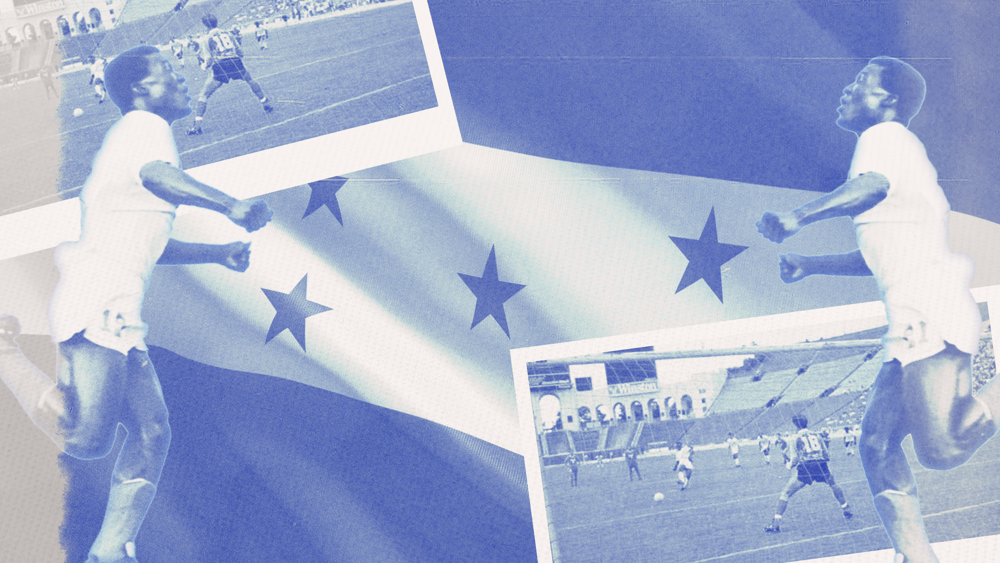MIAMI, Florida – This Friday at 7:00 PM ET, Concacaf will be airing a re-broadcast of two Concacaf Gold Cup classics, the first being the inaugural Gold Cup Final in 1991 between the United States and Honduras, followed by the 2019 Final between Mexico and the U.S. Both matches will be shown on Concacaf’s Facebook and YouTube pages, plus the Concacaf App.
Over 900 goals have been scored in the history of the Concacaf Gold Cup, but the player to do it first was Honduras FW Eduardo Bennett, whose penalty conversion in the 28’ of Honduras’ 4-2 win over Canada in the opening match of Group A of the inaugural Gold Cup in 1991 will forever live in Concacaf lore.
Yet in the moment and just after the match, Bennett’s thought was that he was simply doing what he always did: Score goals.
“In the moment that I scored the goal and afterward I really didn’t think about the history of it. As goalscorers we are accustomed to scoring goals, so when we score goals, it’s is not a big deal. Those are things that are always satisfying when you can say that we won the championship, but we were a step short,” said Bennett in an exclusive interview with Concacaf.com.
Bennett, who was part of the Honduras team that lost the first Gold Cup Final in a penalty shootout to the U.S. following a 0-0 draw, finished his international career with seven Gold Cup goals, which ranks him as third on Honduras’ all-time Gold Cup scoring chart.
“In everything that I do, I always try to perform to my best, giving my all with passion and commitment to feel satisfaction for having done things well, because it is something that I like to do. We cried because we lost the Final, but I have great memories of that national team and Gold Cup, which helped me play abroad. I was able to get a contract to play in Mexico for Cobras in Ciudad Juarez, so I think that it helped me.
“Any time that I played in a Gold Cup, there was the chance to be seen at an international level to then open doors to go somewhere. I was in Mexico and then came back to Honduras, but the Gold Cup opened up the chance for me to go to Argentina, that came during months when there is no activity in South America, so that gave more visibility and chances that people are watching you and could sign you,” said Bennett.
In his time with the Honduran National Team, Bennett measured himself against the likes of Mexico star Hugo Sanchez and El Salvador legend Magico Gonzalez. Now, he sees that the improvement of other teams around the region have made for a more competitive landscape in Concacaf.
“The rivalry between Central American teams is strong. You play against El Salvador, you’re playing against El Magico. You’re playing Mexico, you see Hugo Sanchez. Those were elite players. Now, Panama has improved their footballing level, so have Jamaica and Haiti… You have to be more wary. You can’t just show up and expect to win, and I think that makes things more exciting because other national teams have grown so much,” said Bennett.
While they have come close on multiple occasions, Honduras have not returned to a Gold Cup Final since Bennett and his Catracho teammates did so in 1991. Nevertheless, Bennett is optimistic that it can happen under the stewardship of current Honduras team under Head Coach Fabian Coito.
“I think coach Coito thankfully has given importance to things like the Olympics with the Under-23s and he did a good job. He has now put together a group that was with the Under-23s and can now play in the Gold Cup. I think it is a team that can be very good and have a chance to showcase itself and achieve great things,” said Bennett.
Following his four-goal performance at the 1993 Gold Cup, Bennett was signed by Argentine giants San Lorenzo, beginning a storied tenure in Argentine football. It included winning a league title in San Lorenzo in 1995 under coach Bambino Veira, plus spells in other historic clubs like Argentinos Juniors, Chacarita Juniors and Quilmes.
The intensity felt within Argentine football each week was the perfect fit for a player like Bennett.
“My style is to perform and always give my all, so I was able to adapt to that quickly because it’s a high level of football. It’s demanding, it requires focus. I arrived as a trialist but with a suitcase and the idea that I was going to stay. The coach said, ‘You are going to succeed because of that. You have come to stay.’ So that was an important step for me to have the backing of the coach. When I started to play, the fans identified with me, they called me ‘the son of Pele’ and that motivated me more. I was happy, I felt good and did things well from start to finish.
“The Argentine people are passionate about football and so I was very comfortable because my style is to also be passionate about what I do. The level of competition in Argentina at that time was amazing with Enzo Francescoli, Diego Maradona, [Javier] Saviola, [Juan Sebastian] Veron, [Juan Roman] Riquelme, Marcelo Gallardo, Chicho Serna, [Guillermo] Barros Schelotto, Martin Palermo…. Each team had emblematic players and that made the Argentine league so well-known and watched. Fans were drawn every Sunday at the stadium. For me, that was priceless,” concluded Bennett.






































